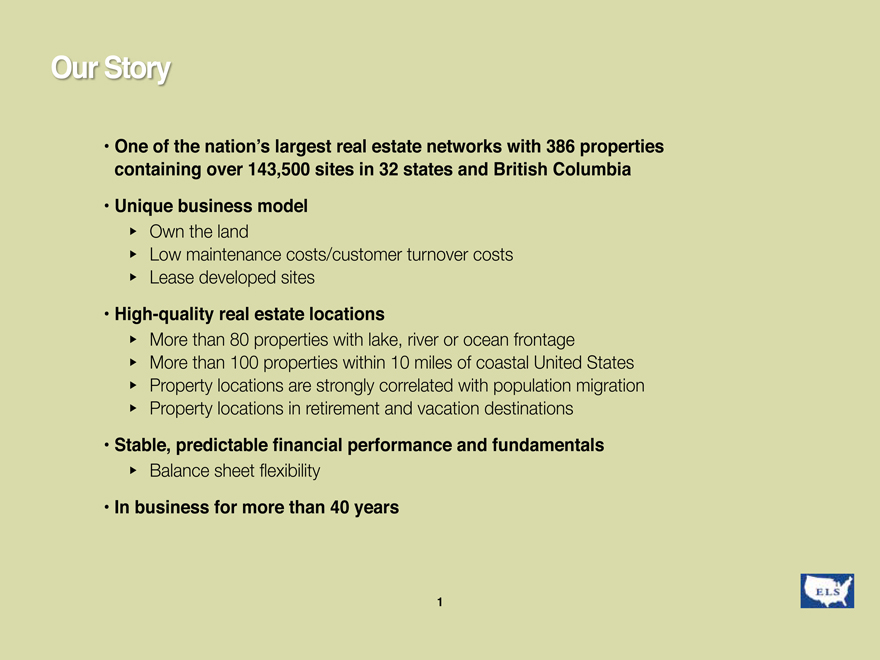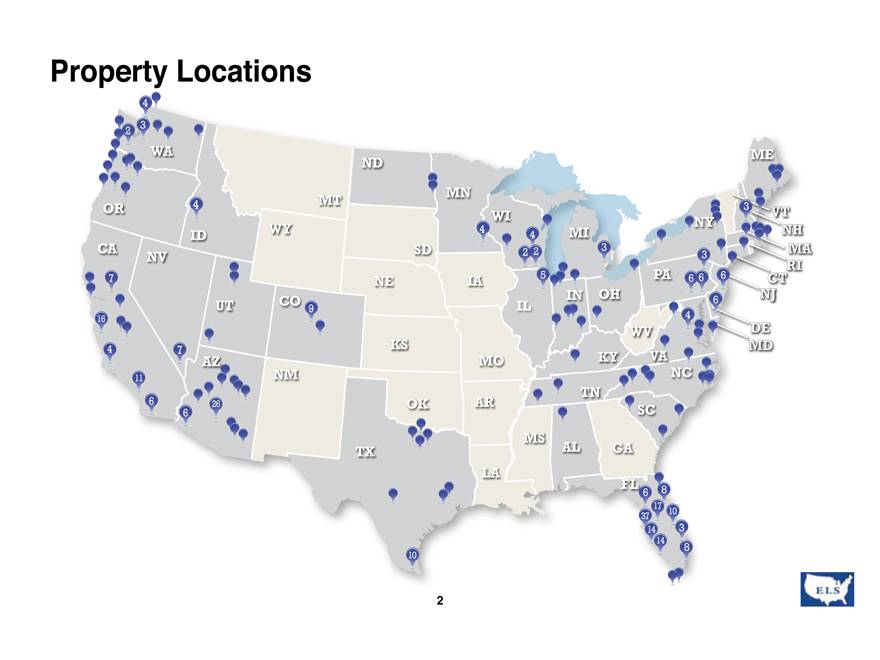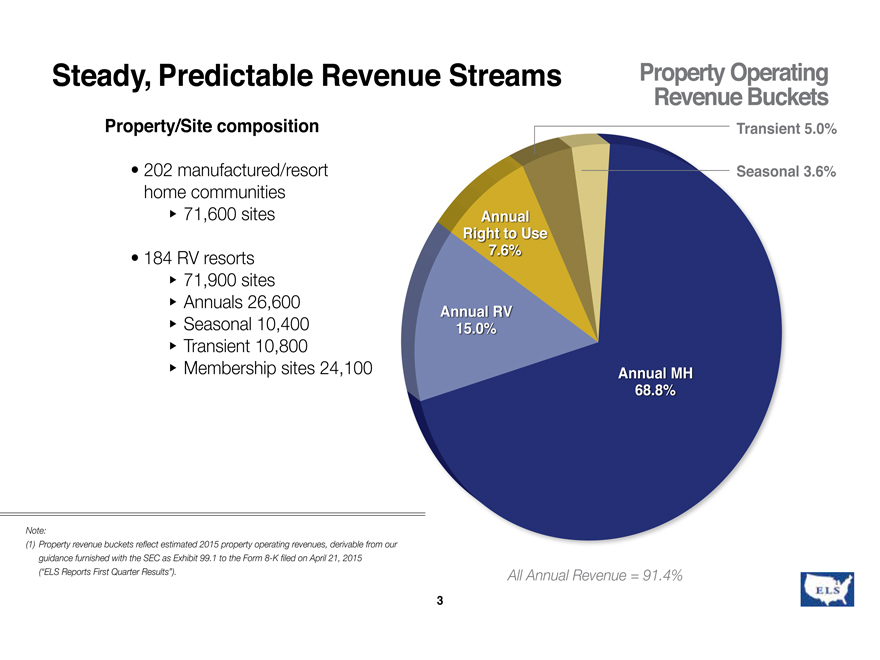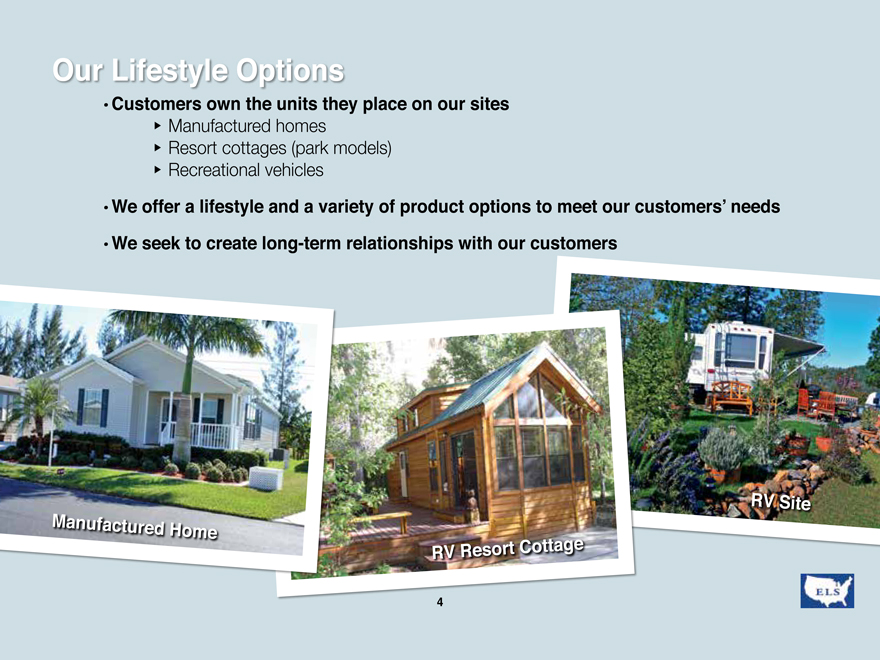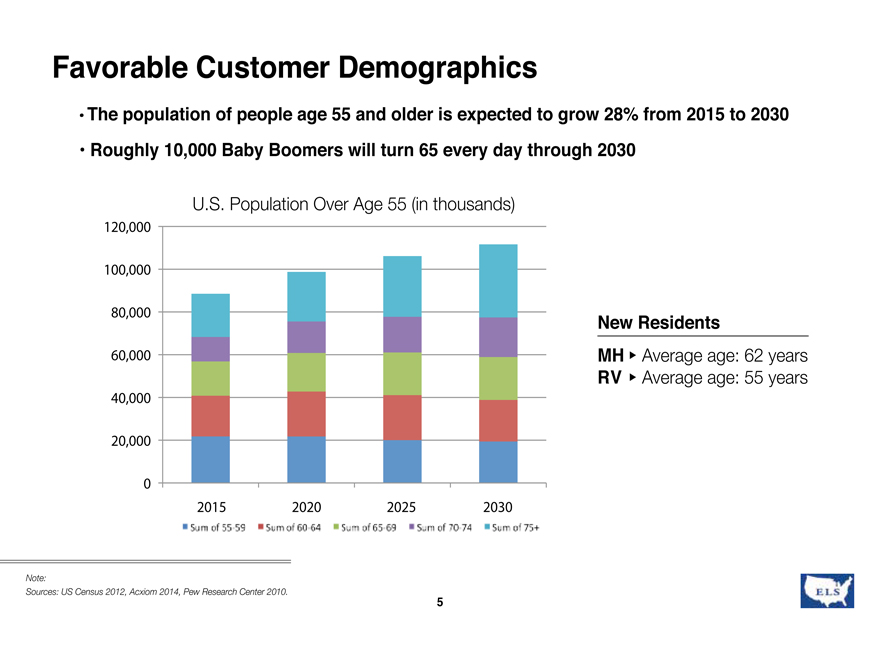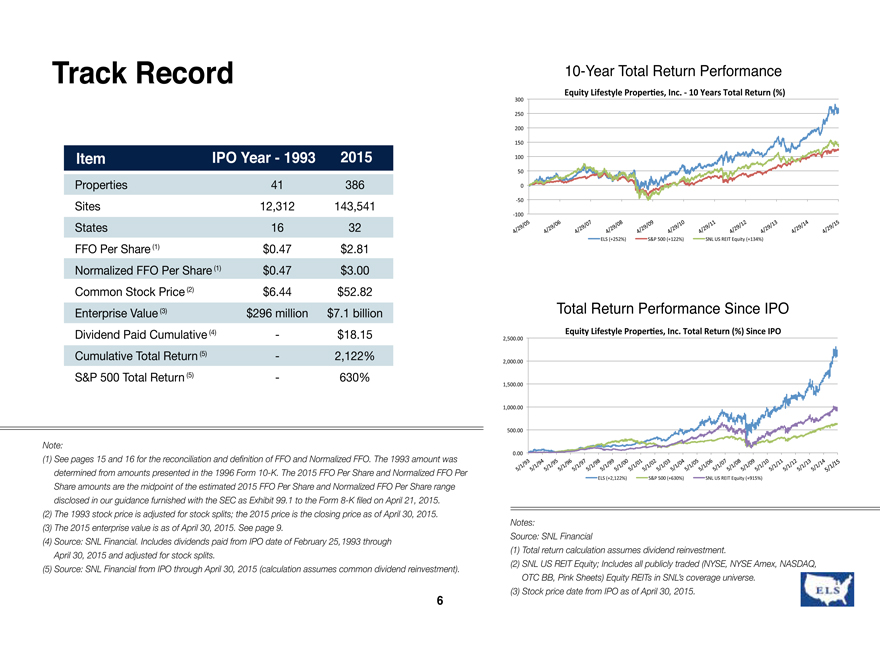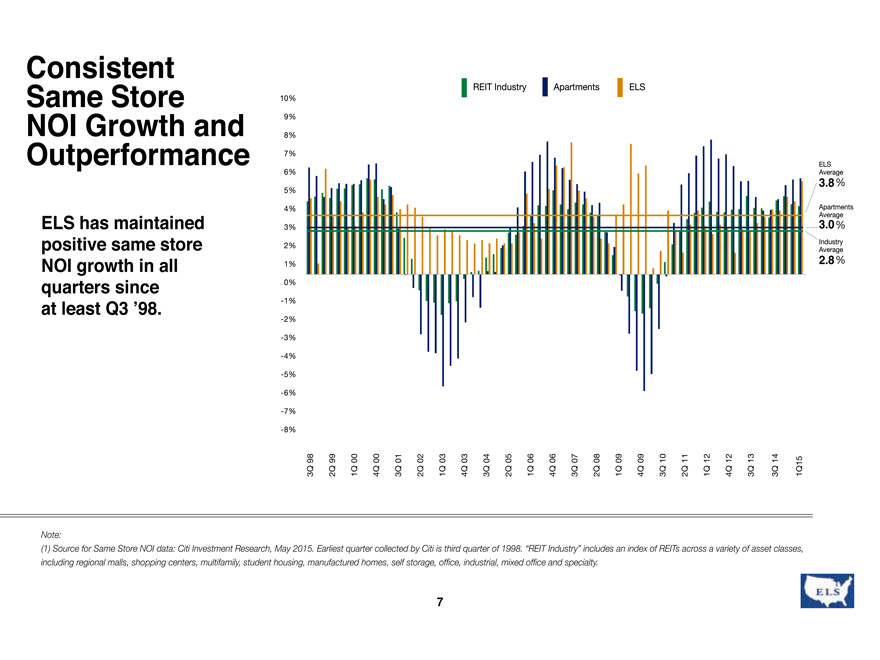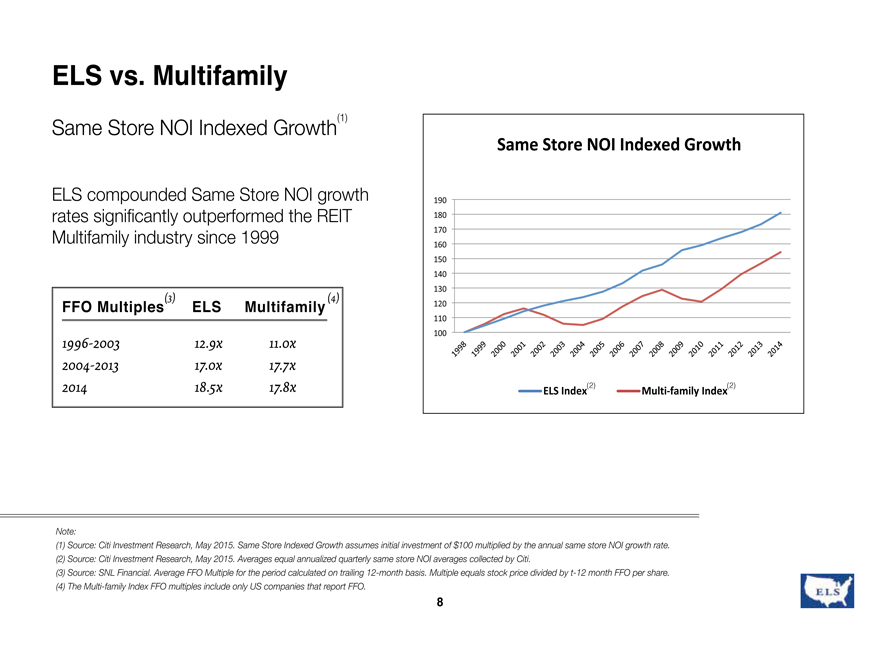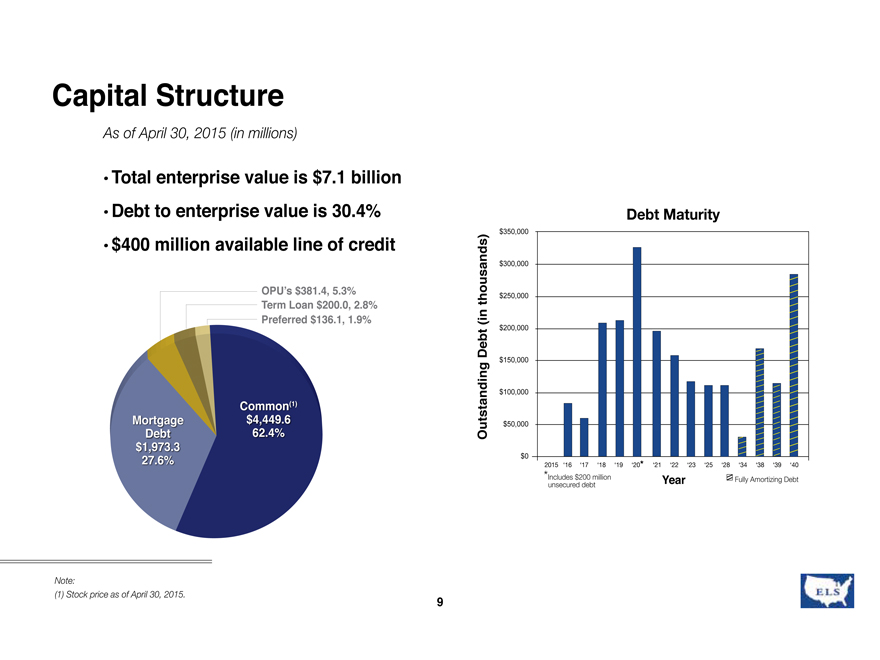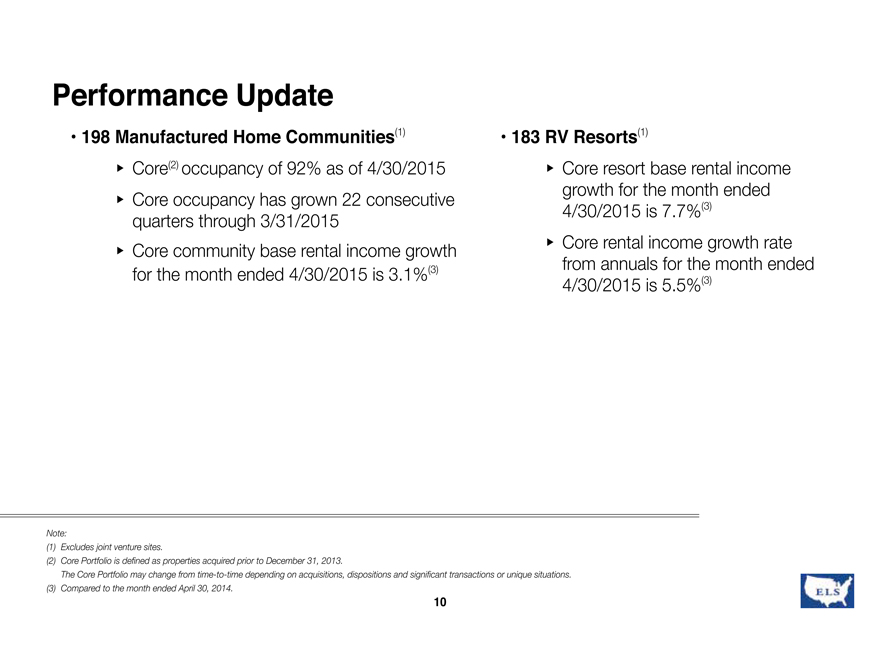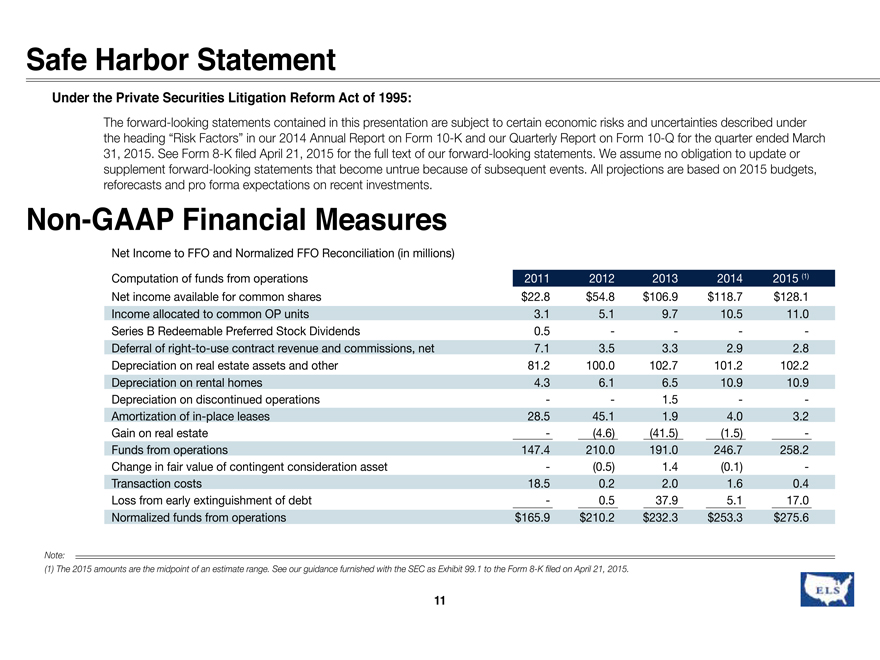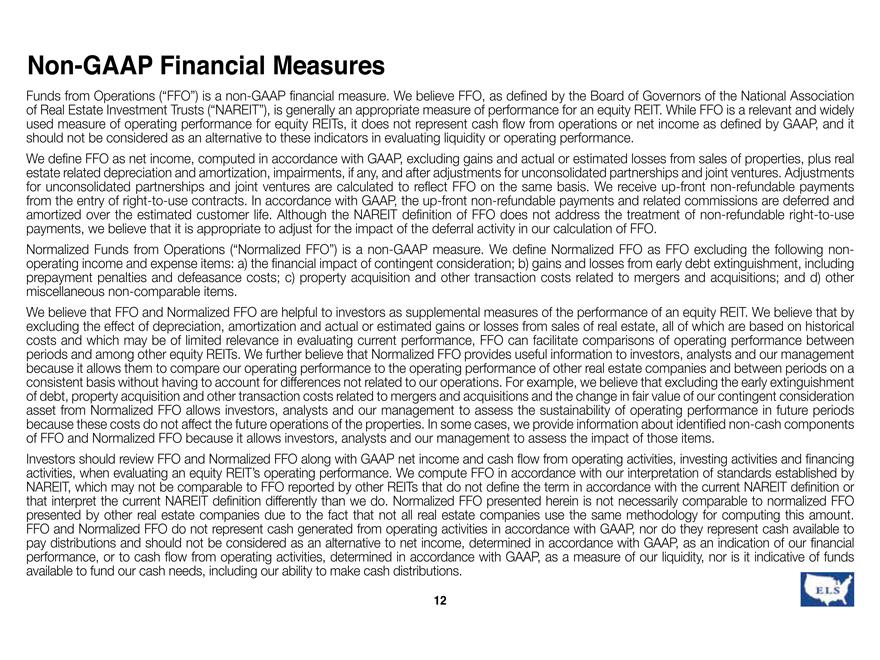Attached files
| file | filename |
|---|---|
| 8-K - 8-K - EQUITY LIFESTYLE PROPERTIES INC | d938538d8k.htm |
| Exhibit 99.1
|
Equity LifeStyle Properties
|
|
Our Story
One of the nation’s largest real estate networks with 386 properties containing over 143,500 sites in 32 states and British Columbia Unique business model uOwn the land uLow maintenance costs/customer turnover costs uLease developed sites
High-quality real estate locations uMore than 80 properties with lake, river or ocean frontage uMore than 100 properties within 10 miles of coastal United States uProperty locations are strongly correlated with population migration uProperty locations in retirement and vacation destinations
Stable, predictable financial performance and fundamentals uBalance sheet flexibility
In business for more than 40 years
1
|
|
Property Locations
4 3 2
WA ME ND
MN
4 MT 3 OR VT
WI NY
WY 4 MI NH ID 4 CA SD 2 2 3 MA
NV 3
RI
7 NE IA 5 PA 6 6 6 CT
IN OH 6 NJ UT CO IL
9
16 4 DE
KS WV MD
4 7 VA
AZ MO KY
11 NM NC
TN
6 26 OK AR
6 SC
MS
TX AL GA LA
FL 8
6
17 10 37
14 3 14
8
10
2
|
|
Steady,Predictable Revenue Streams Property Operating
Revenue Buckets
Property/Site composition Transient 5.0%
• 202 home manufactured/resort communities Seasonal 3.6% u71,600 sites Annual
Right to Use
• 184 RV resorts 7.6% u71,900 sites
uAnnuals 26,600 Annual RV
uSeasonal 10,400 15.0% uTransient 10,800 uMembership sites 24,100 Annual MH
68.8%
Note:
(1) Property revenue buckets reflect estimated 2015 property operating revenues, derivable from our guidance furnished with the SEC as Exhibit 99.1 to the Form 8-K filed on April 21, 2015
(“ELS Reports First Quarter Results”). All Annual Revenue = 91.4%
| 3 |
|
|
|
Our Lifestyle Options
Customers own the units they place on our sites uManufactured homes uResort cottages (park models) uRecreational vehicles
We offer a lifestyle and a variety of product options to meet our customers’ needs We seek to create long-term relationships with our customers
RV Site
Manufactured Home
RV Resort Cottage
4
|
|
Favorable Customer Demographics
The population of people age 55 and older is expected to grow 28% from 2015 to 2030 Roughly 10,000 Baby Boomers will turn 65 every day through 2030
U.S. Population Over Age 55 (in thousands)
120,000
100,000
80,000 New Residents
60,000 MH uAverage age: 62 years RV uAverage age: 55 years
40,000
20,000
0
2015 2020 2025 2030
Note:
Sources: US Census 2012, Acxiom 2014, Pew Research Center 2010.
5
|
|
Track Record 10-Year Total Return Performance
300
Equity
Lifestyle
Proper=es,
Inc.
--?
10
Years
Total
Return
(%)
250
200
150
Item IPO Year—1993 2015 100
50
Properties 41 386 0
Sites 12,312 143,541 --?50
States 16 32 --?100
(1) ELS
(+252%)
S&P
500
(+122%)
SNL
US
REIT
Equity
(+134%)
FFO Per Share $0.47 $2.81
Normalized FFO Per Share (1) $0.47 $3.00
Common Stock Price (2) $6.44 $52.82
Enterprise Value (3) $296 million $7.1 billion Total Return Performance Since IPO
Dividend Paid Cumulative (4)—$18.15 2,500.00
Equity
Lifestyle
Proper=es,
Inc.
Total
Return
(%)
Since
IPO
Cumulative Total Return (5)—2,122%
2,000.00
S&P 500 Total Return (5)—630%
1,500.00
1,000.00
500.00
Note:
(1) See pages 15 and 16 for the reconciliation and definition of FFO and Normalized FFO. The 1993 amount was 0.00
determined from amounts presented in the 1996 Form 10-K. The 2015 FFO Per Share and Normalized FFO Per
Share amounts are the midpoint of the estimated 2015 FFO Per Share and Normalized FFO Per Share range ELS
(+2,122%)
S&P
500
(+630%)
SNL
US
REIT
Equity
(+915%)
disclosed in our guidance furnished with the SEC as Exhibit 99.1 to the Form 8-K filed on April 21, 2015.
(2) The 1993 stock price is adjusted for stock splits; the 2015 price is the closing price as of April 30, 2015.
Notes:
(3) The 2015 enterprise value is as of April 30, 2015. See page 9.
Source: SNL Financial
(4) Source: SNL Financial. Includes dividends paid from IPO date of February 25,1993 through
(1) Total return calculation assumes dividend reinvestment.
April 30, 2015 and adjusted for stock splits.
(2) SNL US REIT Equity; Includes all publicly traded (NYSE, NYSE Amex, NASDAQ,
(5) Source: SNL Financial from IPO through April 30, 2015 (calculation assumes common dividend reinvestment).
OTC BB, Pink Sheets) Equity REITs in SNL’s coverage universe.
(3) Stock price date from IPO as of April 30, 2015.
6
|
|
Consistent Same Store NOI Growth and Outperformance
3.8
ELS has maintained 3.0 positive NOI growth same in all store 2.8 quarters at least Q3 since ’98.
98 99 00 000102 03 03 0405 06 06 070809 09 10 11 12 12 1314
3Q 2Q 1Q 4Q 3Q 2Q 1Q 4Q 3Q 2Q 1Q 4Q 3Q 2Q 1Q 4Q 3Q 2Q 1Q 4Q 3Q 3Q 1Q15
Note:
(1) Source for Same Store NOI data: Citi Investment Research, May 2015. Earliest quarter collected by Citi is third quarter of 1998. “REIT Industry” includes an index of REITs across a variety of asset classes, including regional malls, shopping centers, multifamily, student housing, manufactured homes, self storage, office, industrial, mixed office and specialty.
7
|
|
ELS vs. Multifamily
Same Store NOI Indexed Growth(1)
Same
Store
NOI
Indexed
Growth
ELS compounded Same Store NOI growth 190
rates significantly outperformed the REIT 180
Multifamily industry since 1999 170
160
150
140
130
(3) (4)
FFO Multiples ELS Multifamily 120
110
100
1996-2003 12.9x 11.0x 2004-2013 17.0x 17.7x
2014 18.5x 17.8x (2) (2)
ELS Index Multi-family Index
Note:
(1) Source: Citi Investment Research, May 2015. Same Store Indexed Growth assumes initial investment of $100 multiplied by the annual same store NOI growth rate. (2) Source: Citi Investment Research, May 2015. Averages equal annualized quarterly same store NOI averages collected by Citi.
(3) Source: SNL Financial. Average FFO Multiple for the period calculated on trailing 12-month basis. Multiple equals stock price divided by t-12 month FFO per share. (4) The Multi-family Index FFO multiples include only US companies that report FFO.
8
|
|
Capital Structure
As of April 30, 2015 (in millions)
Total enterprise value is $7.1 billion
Debt to enterprise value is 30.4% Debt Maturity
credit $350,000
$400 million available line of
$300,000
OPU’s $381.4, 5.3% thousands) $250,000 Term Loan $200.0, 2.8% Preferred $136.1, 1.9% (in
Debt $200,000 $150,000
$100,000
Common(1)
Mortgage Debt $62. 4,449. 4%6 Outstanding $50,000 $27. 1,973. 6%3 $0
2015 ‘16 ‘17 ‘18 ‘19 ‘20* ‘21 ‘22 ‘23 ‘25 ‘28 ‘34 ‘38 ‘39 ‘40
*Includes $200 million Year Fully Amortizing Debt unsecured debt
Note:
(1) Stock price as of April 30, 2015. 9
|
|
Performance Update
198 Manufactured Home Communities(1) 183 RV Resorts(1) uCore(2) occupancy of 92% as of 4/30/2015 uCore resort base rental income growth for the month ended uCore occupancy has grown 22 consecutive 4/30/2015 is 7.7%(3) quarters through 3/31/2015 uCore community base rental income growth uCore rental income growth rate
(3) from annuals for the month ended for the month ended 4/30/2015 is 3.1% (3) 4/30/2015 is 5.5%
Note:
(1) Excludes joint venture sites.
(2) Core Portfolio is defined as properties acquired prior to December 31, 2013.
The Core Portfolio may change from time-to-time depending on acquisitions, dispositions and significant transactions or unique situations. (3) Compared to the month ended April 30, 2014. 10
|
|
Safe Harbor Statement
Under the Private Securities Litigation Reform Act of 1995: the The heading forward-looking “Risk Factors” statements in our contained 2014 Annual in this Report presentation on Form are 10-K subject and our to certain Quarterly economic Report on risks Form and 10-Q uncertainties for the quarter described ended under March supplement 31, 2015. See forward-looking Form 8-K filed statements April 21, 2015 that for become the full untrue text of because our forward-looking of subsequent statements. events. All We projections assume no are obligation based on to 2015 update budgets, or reforecasts and pro forma expectations on recent investments.
Non-GAAP Financial Measures
Net Income to FFO and Normalized FFO Reconciliation (in millions)
Computation of funds from operations 2011 2012 2013 2014 2015 (1) Net income available for common shares $22.8 $54.8 $106.9 $118.7 $128.1 Income allocated to common OP units 3.1 5.1 9.7 10.5 11.0 Series B Redeemable Preferred Stock Dividends 0.5 ——— -Deferral of right-to-use contract revenue and commissions, net 7.1 3.5 3.3 2.9 2.8 Depreciation on real estate assets and other 81.2 100.0 102.7 101.2 102.2 Depreciation on rental homes 4.3 6.1 6.5 10.9 10.9 Depreciation on discontinued operations —— 1.5 — -Amortization of in-place leases 28.5 45.1 1.9 4.0 3.2 Gain on real estate — (4.6) (41.5) (1.5) -Funds from operations 147.4 210.0 191.0 246.7 258.2 Change in fair value of contingent consideration asset — (0.5) 1.4 (0.1) -Transaction costs 18.5 0.2 2.0 1.6 0.4 Loss from early extinguishment of debt — 0.5 37.9 5.1 17.0 Normalized funds from operations $165.9 $210.2 $232.3 $253.3 $275.6
Note:
(1) The 2015 amounts are the midpoint of an estimate range. See our guidance furnished with the SEC as Exhibit 99.1 to the Form 8-K filed on April 21, 2015.
11
|
|
Non-GAAP Financial Measures
Funds from Operations (“FFO”) is a non-GAAP financial measure. We believe FFO, as defined by the Board of Governors of the National Association of Real Estate Investment Trusts (“NAREIT”), is generally an appropriate measure of performance for an equity REIT. While FFO is a relevant and widely used measure of operating performance for equity REITs, it does not represent cash flow from operations or net income as defined by GAAP, and it should not be considered as an alternative to these indicators in evaluating liquidity or operating performance.
We define FFO as net income, computed in accordance with GAAP, excluding gains and actual or estimated losses from sales of properties, plus real estate related depreciation and amortization, impairments, if any, and after adjustments for unconsolidated partnerships and joint ventures. Adjustments for unconsolidated partnerships and joint ventures are calculated to reflect FFO on the same basis. We receive up-front non-refundable payments from the entry of right-to-use contracts. In accordance with GAAP, the up-front non-refundable payments and related commissions are deferred and amortized over the estimated customer life. Although the NAREIT definition of FFO does not address the treatment of non-refundable right-to-use payments, we believe that it is appropriate to adjust for the impact of the deferral activity in our calculation of FFO.
Normalized Funds from Operations (“Normalized FFO”) is a non-GAAP measure. We define Normalized FFO as FFO excluding the following non-operating income and expense items: a) the financial impact of contingent consideration; b) gains and losses from early debt extinguishment, including prepayment penalties and defeasance costs; c) property acquisition and other transaction costs related to mergers and acquisitions; and d) other miscellaneous non-comparable items.
We believe that FFO and Normalized FFO are helpful to investors as supplemental measures of the performance of an equity REIT. We believe that by excluding the effect of depreciation, amortization and actual or estimated gains or losses from sales of real estate, all of which are based on historical costs and which may be of limited relevance in evaluating current performance, FFO can facilitate comparisons of operating performance between periods and among other equity REITs. We further believe that Normalized FFO provides useful information to investors, analysts and our management because it allows them to compare our operating performance to the operating performance of other real estate companies and between periods on a consistent basis without having to account for differences not related to our operations. For example, we believe that excluding the early extinguishment of debt, property acquisition and other transaction costs related to mergers and acquisitions and the change in fair value of our contingent consideration asset from Normalized FFO allows investors, analysts and our management to assess the sustainability of operating performance in future periods because these costs do not affect the future operations of the properties. In some cases, we provide information about identified non-cash components of FFO and Normalized FFO because it allows investors, analysts and our management to assess the impact of those items.
Investors should review FFO and Normalized FFO along with GAAP net income and cash flow from operating activities, investing activities and financing activities, when evaluating an equity REIT’s operating performance. We compute FFO in accordance with our interpretation of standards established by NAREIT, which may not be comparable to FFO reported by other REITs that do not define the term in accordance with the current NAREIT definition or that interpret the current NAREIT definition differently than we do. Normalized FFO presented herein is not necessarily comparable to normalized FFO presented by other real estate companies due to the fact that not all real estate companies use the same methodology for computing this amount. FFO and Normalized FFO do not represent cash generated from operating activities in accordance with GAAP, nor do they represent cash available to pay distributions and should not be considered as an alternative to net income, determined in accordance with GAAP, as an indication of our financial performance, or to cash flow from operating activities, determined in accordance with GAAP, as a measure of our liquidity, nor is it indicative of funds available to fund our cash needs, including our ability to make cash distributions.
12
|
|
Two Equity North LifeStyle Riverside Plaza, Properties Chicago, Illinois 60606
800-247-5279 | www.EquityLifeStyle.com


